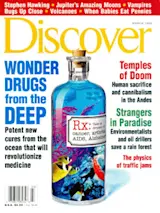Hawking's Vision His body may be confined to a wheelchair, but the mind of Stephen Hawking soars, grappling with the most profound mysteries of the universe, from the birth and death of black holes to the fate of the cosmos itself. DISCOVER associate editor Kathy A. Svitil recently interviewed Hawking after he talked to a packed auditorium in San Jose, California, about the future of science. The theoretical physicist predicted the development of intelligent, self-aware computers that could match the human brain, not to mention space travel well beyond this solar system.
Svitil asked: What are the biggest unsolved problems in physics today? "The theory of everything," Hawking said--the name physicists give to the undiscovered laws that would unite all theories about the universe, from quantum mechanics to Einstein's general theory of relativity. "We feel that we are near, but we never get there. It always seems just over the rainbow's edge." Despite the difficulties scientists face in tackling the all-in-one theory, Hawking is certain the answer will come soon: "My money is on it."
Another enigma, he said, is "understanding the origin of the universe and why it produced the universe that we see." Too many theories, he suggests, explain some of the things we see in nature, but they can't be applied to all conditions. "Cosmology is not science if it does not produce theories with predictions that agree with what we observe," he said.
Finally, Svitil asked what Hawking thought of John Horgan's recent book, The End of Science, in which the author argues that all the fundamental problems of science have been resolved. Hawking likes to give succinct answers because he is disabled by amyotrophic lateral sclerosis--Lou Gehrig's disease--and must communicate by spelling out his words on a computer. His reply? "Garbage."
========================================================= Museum Review: Rexes and Roaches in L.A. Just inside the main entrance of the Natural History Museum of Los Angeles County are full-size replicas of the skeletons of a Tyrannosaurus rex and a Triceratops prorsus locked in mortal combat. The dramatic centerpiece is fitting because the dinosaur halls are the museum's most popular exhibits. If you like big beasts, this is the time to visit. From now through the beginning of May, the museum will feature The Great Russian Dinosaurs, a collection of early dinosaurs, mammal-like reptiles, ancient fish, and sea lizards discovered throughout Russia and Mongolia.
Compared with such grand old institutions as the American Museum of Natural History in New York and the Smithsonian in Washington, some of the exhibits here are a bit skimpy. For example, while New York boasts a 94-foot-model of a blue whale, L.A. displays an eight-foot-long bluefin tuna skeleton. Still, the museum houses its share of prizes--the world's largest collection of southwestern moths and butterflies, and North America's only publicly displayed specimen of megamouth, the world's rarest shark. You'll also see some bizarre live bugs, including Madagascar hissing cockroaches, giant stick insects, and dung beetles.
Open 9:30 to 5 weekdays, 10 to 5 on weekends. Adults $8; seniors and students $5.50; children $2. Children under five get in free.
========================================================= Paleolithic Protectress Mysterious statuettes of very pregnant women have been dug up all over Europe. Most were carved 30,000 to 10,000 years ago. But what were they for? The conventional view is that they were fertility icons. Not so, argues anthropologist Randall White of New York University. The paleolithic hunter-gatherers who sculpted the figurines, he says, would not have encouraged fertility. More mouths to feed would be the last thing a small band of Ice Age hunters needed. Hunting cultures that survive today, White says, actually strive to limit the number of births.
He believes that the figurines were intended to protect a woman during pregnancy and labor. He has examined more than 100 of the objects; many show anatomical details, such as dilation, depicting a woman in the last minutes of pregnancy. "From wear on the surface, we can tell if they were passed from generation to generation," he says. "They weren't. They were put into the ground almost immediately. That fact, along with the anatomical detail, suggests that they were about getting to birth safely, and not about having lots of kids."
========================================================= Hand to Mouth What would conversation be like without hand gestures? Difficult, and in countries like Italy, perhaps unimaginable. It was her travels to Italy, in fact, that inspired Jana Iverson, a psychologist at the University of Chicago, to see whether we learn gesturing from others or if it is an innate part of speaking. She asked 24 children, 12 of whom had been blind from birth, to compare the amounts of water in two identical glasses, then compare them again after the water in one glass was poured into a dish. (The blind children explored the water and receptacles with their hands.)
Asked how they arrived at an answer, both blind and sighted children used the same gestures as they spoke, including cupping one hand into a C shape and imitating the act of pouring. Blind children gestured even when talking to an experimenter they knew was blind. "The fact that someone who had never seen gestures before would gesture," says Iverson, "even to a partner who they know can't see, suggests that gesturing and speaking are tightly connected in some very fundamental way in our brains."
========================================================= Early Warning When Guatemala's most active volcano began spouting lava thousands of feet into the air last June, Luke Flynn wasn't surprised--he had predicted it would blow four days earlier. A volcanologist at the University of Hawaii at Honolulu, Flynn is the first to use satellites to spot impending eruptions, and his work may lead to a reliable early-warning system.
With computers--and the help of two Earth-orbiting infrared cameras--Flynn has been watching 11 active volcanoes in the Western Hemisphere for the past two years. His team has developed an automated system to analyze reams of satellite data within minutes after they are beamed to Earth.
Early last May, Flynn noticed that the Pacaya volcano in Guatemala seemed to be stirring. Satellites showed that the ground around Pacaya was heating up rapidly. Flynn wondered if the volcano would go off. It did on May 20--covering nearby Guatemala City with a quarter of an inch of ash and causing the city's airport to be closed. In June, when he saw the hot spot under Pacaya heating up again, he predicted another eruption within days. Four days later, the volcano blew again. "As the lava rose up from Pacaya, it created cracks in the surface of the volcano that allowed hot gases to escape," says Flynn. "The gases are what we detect with the satellite."
So why can't Flynn predict when any volcano will erupt? Because no two are alike. Every volcano has its own geology and history, and each needs to be studied so that its warning signals can be recognized. The two volcano-watching satellites now orbiting Earth aren't enough. A system of six to eight, says Flynn, could keep tabs on nearly all the volcanoes around the globe.
========================================================= The Dracula Syndrome Neurologist Juan Gomez-Alonso has formulated an unusual medical hypothesis, an explanation for the origin of vampire legends. Stories of lusty, bloodthirsty vampires, says Gomez-Alonso, who works at Xeral Hospital in Vigo, Spain, may have been inspired by people suffering from rabies. He traces the connection to a rabies outbreak in central Europe in the early eighteenth century, not long before stories of vampires began circulating. "Some of the symptoms, such as aggressiveness and hypersexuality, would not have been seen as manifestations of a disease," he says. "Uneducated people could have thought all this was the work of a malign being. Moreover, the bizarre rejection of some stimuli--odors, light, water, and mirrors--shown by rabid humans must have been quite puzzling."
What's next for Gomez-Alonso, werewolves? As it happens, yes. "A connection between rabies and the development of the werewolf legend could be hypothesized."
========================================================= Out of Africa: Footprints in the Sands of Time After a heavy rain one day 200,000 years ago, someone small walked across a sand dune. Sand covered the tracks and eventually hardened into sandstone. More centuries passed, and the sandstone eroded. Some construction workers on a break in Nahoon, South Africa, discovered the tracks, which were thought to be 30,000 years old. Now geologist Dave Roberts, at the Council for Geoscience in Cape Town, has redated the impressions and says they are 200,000 years old, the oldest human footprints on Earth. "We have far more powerful dating techniques now," says Roberts. He used thermoluminescence, a dating method that measures when sand grains were last exposed to light. Only about seven inches long, the prints clearly show five toes and a well-developed arch.
========================================================= Bits and Pieces of Armageddon About 65 million years ago, something very large from space smacked the Yucatan, triggering tidal waves more than 300 feet high, fires that burned continents, and a dust cloud that blocked the sun for months. The impact may have killed 90 percent of all vertebrates on land, including the dinosaurs. Whether that infamous impactor was an asteroid or a comet has been a matter of debate. Thanks to Frank Kyte, a UCLA geochemist, the debate may now be over. Kyte has found the first known fragment of the agent of doom itself. The killer, he says, was an asteroid.
Kyte was examining sediment cores drilled from the Pacific just north of Hawaii. Unlike most other marine sediments, those from around the time of the impact are bereft of microfossils--their absence marks a planetwide disaster. In one of the core samples, which were mostly fine-grained sediments, Kyle spotted something unusual. "I saw this little rock in the core," he says, "and I plucked it out."
The rock turned out to contain a 2.5-millimeter-long fragment of an asteroid. The texture of Kyte's rock, and the high concentration of iridium, chromium, and iron, suggested that it came from an asteroid and not a loose, sooty ice ball like a comet. "We probably have," he says, "a piece of the object responsible for one of the worst days in the history of Earth."
========================================================= Ancient Blues According to legend, the ancient British queen Boadicea daubed herself with blue dye in A.D. 60 before slicing the Roman Ninth Legion to pieces. The dye came from the leaves of a plant called woad, the chief source of indigo until the sixteenth century. Although long since replaced by synthetic chemicals, the old process may be due for a revival, says Philip John, a plant biochemist at the University of Reading in England. Those forgotten techniques, he says, could allow industry to replace some of the chemicals now used to make dyes for denim.
Using an instruction manual compiled by early American colonists--who brought the woad plant to North America--John harvested the leaves, crushed them into a paste, and formed balls the size of grapefruits. He then fermented them in a vat. He discovered that a bacterium called Clostridium efficiently converts indigo from woad into a soluble state that can be used as a dye. "This is a rediscovery of a forgotten biotechnology," says John, "that could provide us with a less polluting dyeing industry for the next century."
========================================================= Next: Rockets at O'Hare The space shuttle and its rockets are huge--some 4.5 million pounds at liftoff. About 85 percent of that weight is fuel. Designed to work in a vacuum, the shuttle must carry not only fuel but the oxygen to burn it. Because this is an inefficient way to go, NASA engineers have recently tested an engine that gets some of its oxygen on the run. Uwe Hueter of the Marshall Space Flight Center in Huntsville, Alabama, says the engine could cut takeoff weights in half.
A spacecraft equipped with this engine would take off like a rocket, says Hueter. But within minutes, incoming air would begin to supplement liquid oxygen. Once the spacecraft hit 1,500 miles per hour--twice the speed of sound--the liquid oxygen would shut off completely and the engine would burn fuel mixed with air. Operating like a ramjet, the craft would accelerate to about ten times the speed of sound. When the air got too thin for the engine to breathe, the ship would shift back to rocket mode to punch its way into space.
Recent wind-tunnel tests of the idea were a smashing success, says Hueter, who plans flight tests in about four years. In the long run--about 15 years hence--Hueter hopes the engine will be matched with advanced materials under development at NASA to create a vehicle nearly as inexpensive as a jetliner. "My vision is that this would be a horizontal takeoff and horizontal lander," he says. "If we can keep the weight below a million pounds, which is about what a 747 weighs, we could even use existing airports."
========================================================= Fetal Surgery The delivery of a single healthy boy doesn't usually make news. But the circumstances surrounding one baby born at Children's Hospital of Philadelphia last year were extraordinary. Diagnosed before birth with spina bifida, the infant now has only minor impairments, thanks to a remarkable operation carried out in utero by pediatric surgeon Scott Adzick.
Spina bifida, one of the most common birth defects in the United States, is a devastating diagnosis. Caused by the failure of the spine to close during the first month of pregnancy, it can produce paralysis, mental retardation, and a fluid buildup in the brain.
The symptoms are believed to be caused by toxins that damage unprotected nerves in an exposed spinal cord. Fetal urine in the amniotic fluid is the worst offender. "It basically eats away the cord," says Adzick. He hoped that surgery to enclose the spinal cord could prevent serious birth defects. To perform the operation on the 23-week-old fetus, Adzick opened the mother's uterus and used muscle and skin from the fetus's back to close the gap along the spinal column, which extended from the upper back to almost the end of the spine.
When the baby was born seven weeks later, his only symptoms were a right clubfoot and some immobility in his left foot. Now ten months old, the boy is otherwise normal.
========================================================= Sounds of Silence The trill of a trumpet is a glorious thing in concert, but something else when it comes from next door. Yamaha's Silent Brass satisfies a bugler's urge to blow while eliminating the risk of eviction. Silent Brass looks like a standard mute that covers the end of a horn, but with it a player can hear each note in all its unmuffled glory. Microphones in the mute send stifled notes to a processor, which converts them into digital signals that are played back through headphones at full volume. Musicians can even invite buddies over for a jam session and hook up their instruments to the same processor. Silent Brass sells for $269 to $500, depending on the instrument. Yamaha can also silence cellos, violins, and drums.














